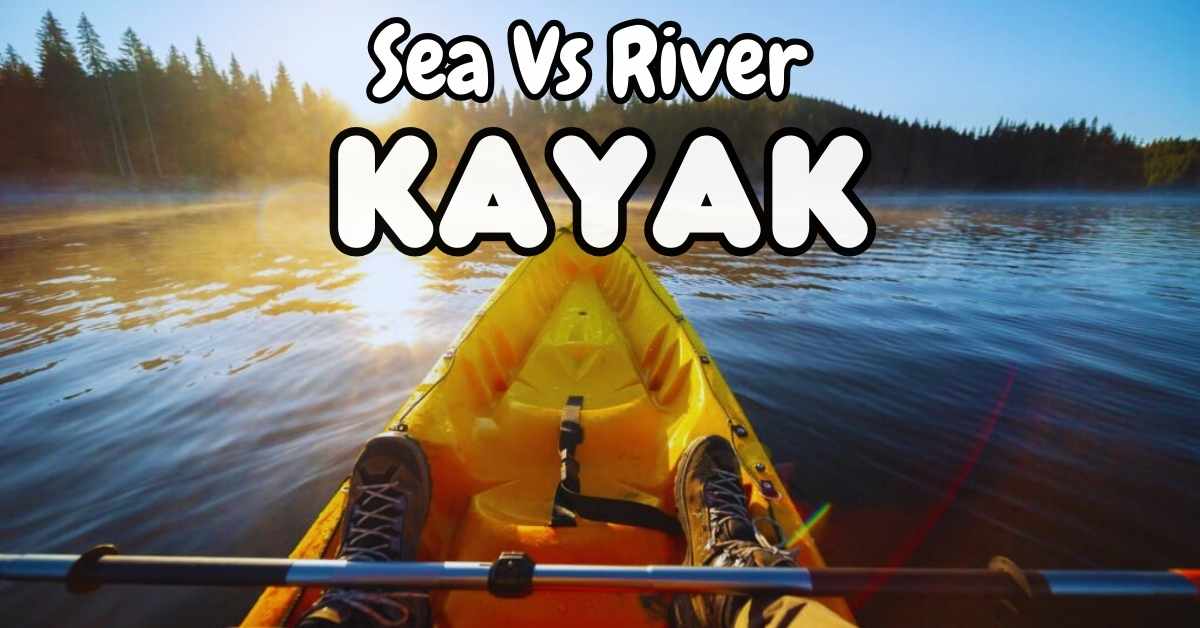Sea kayaks and river kayaks may look similar, but telling them apart is not easy.
The decision to choose between a sea kayak and a river kayak can be overwhelming for beginners.
If you’re wondering how sea kayaking is different from river kayaking, we have an answer for you. It’s not about the size or location, but rather the unique experiences they each offer!
Let’s take a look at the various characteristics that make up the appeal of each craft.
Table of Contents
What is a Sea Kayak vs River Kayak?
Sea kayaks and river kayaks are two distinct varieties of recreational craft; however, they share many similarities. Both vessels boast unrestricted mobility while navigating rivers or lakes.
So unless you seek out a sea route these vessels can be used just as well by those who reside inland!
However, their primary difference is that sea kayaks have been designed specifically for use at sea; whereas river kayaks provide an alternative mode of transportation on land.
Sea Kayak vs River Kayak, What’s the Difference?
Launched mid-1960s, the Sea Kayak was recognized as a new design more than forty years ago. This vessel boasts a light yet strong hull structure with ample buoyancy to ensure stability in any situation!
It is ideal for individuals looking for both speed and fun when racing against the waves. If you’re seeking a versatile craft capable of traversing both waterways and oceans alike then this could be your pick!
The River Kayak is similar to its sister boat, but it is even more versatile. The River Kayak’s small size lets you go into shallow water and reach even deeper spots easily.
An experienced owner can customize their boat with deck fittings to turn it into an expedition vehicle. This allows them to go on sea trips and explore remote areas on land.
What is the Purpose of Sea Kayaking?
Sea kayaking is a great choice if you want an exciting adventure that mixes the fun of being on the water with the calmness of nature.

Kayaking to these water locations is challenging and rewarding. Experienced paddlers may find it beneficial to explore these areas at sea level instead of climbing mountains or crossing rivers by walking.
This gives them a chance to enjoy more without putting in more effort. Sea kayaking has clear advantages compared to river kayaking.
Sea kayaking allows you to visit beautiful coastal areas. You can explore remote bays, beaches, and lagoons while enjoying stunning ocean views.
Compared to activities like whitewater rafting, which involve navigating through rapids, this activity is generally less physically demanding and inconvenient. However, it offers even more experiential rewards than traditional options.
What is the Purpose of River Kayaking?
River kayaking is a great way to learn about a river before exploring its smaller parts or larger bodies of water.
River kayaking helps paddlers to understand the river better. It also makes them more aware of their surroundings and potential dangers.

If you’re feeling adventurous, your journey could take you into uncharted territory. Experienced boaters might want to explore new and distant parts of rivers that they’ve never been to before. This can be an exciting and rewarding experience!
Sea Kayak Vs River Kayak – How Fast Can You Go?
Sea kayaks and river kayaks can both travel at speeds of up to 18 miles per hour (mph), though there are no direct comparisons between the two.
Rivers are typically braver than open seas, as they lack any kind of barrier that may obstruct your passage.
They are also much more forgiving when it comes to speed – provided you don’t head out into choppy waters! On land, consider whether or not there is a stream nearby: the current may make for an exhilarating ride!
Sea Kayak Vs River Kayak – Which is More tippy?
River kayaking is a sport of exploration, discovery and relaxation. Its tranquil ambiance alongside its majestic landscapes provide an inviting experience for beginners yet challenging endeavors for experts alike.
On the other hand, sea kayaking is all about speed – it’s its raison d’être! With this in mind it becomes obvious that sea kayaks are inherently more unstable than river ones; thus making them less suitable for those who wish to take on such adventures without any risk whatsoever.
If you have a penchant for adventure or are seeking to master a new skill, then sea kayaking could be the perfect vessel for you!
After all, these vessels can accommodate many different types of users from beginner through expert – making them an ideal choice if your goal is to expand your horizons (or even just learn something new!).
Sea Kayak Vs River Kayak – Which has Better Balance/Resistance?
River Kayaks are typically built with increased buoyancy, and thus a greater sense of balance. This attribute makes paddling in moving water more manageable – especially when compared to its sea-going brother.
On the flipside, due to their shallow profile and lack of buoyancy it’s more difficult for River kayaks to contend with waves breaking over rocks and reefs.
For that reason they’re more suitable for leisurely fishing excursions rather than expeditions out on the open sea!

Sea kayaks are generally engineered with performance in mind, making them incredibly stable in choppy waters.
Despite being relatively lightweight, low drag reduces fatigue while boat speed helps you maintain control while enjoying its exhilarating sensation of flight at sea!
Sea Kayak Vs River Kayak – Which are Better for Whitewater/Narrowgauge Canals?
If you wish to explore the rivers of Europe, a sea kayak would be your best bet. Not only does it provide above-average stability and maneuverability, but also makes navigating through narrow canals an effortless experience!
However, if you are seeking to venture into the uncharted waters of whitewater rapids or narrow gauge waterways in the United States, then river kayaks may be more suitable. They provide increased control over steering as well as greater resistance against punctures.
Conclusion
River and sea kayaks are two distinctly different modes of transport, so which one should you choose?
For most people, a river or sea kayak is the ideal mode of travel. There are many advantages associated with each type of vessel; however when it comes to which one is more suitable for your needs may be dependent on personal preference.
The simplest option is choosing a sea kayak if you prefer open spaces. If you’re contemplating crossing an expansive body of water such as the Pacific Ocean, then make sure you purchase a compact vessel that can effortlessly traverse long distances!
